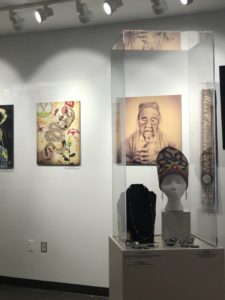
Cherokee Heritage exhibit in the UC. The photo was taken by Hannah Fink.
Western North Carolina is nestled in the beautiful mountains of the Blue Ridge region. It’s home to the color-changing leaves you can experience every fall, the music of the Pride of the Mountains you can hear in Cullowhee and is chockful of history and heritage you can see all around. But not for long.
The Eastern Band of Cherokee tribe in Western North Carolina is home to 14,000 members and dwindling. As tribe numbers decline, their language is taken with them. In the last 20 years, the number of Cherokee speakers has halved in size, with only 460 fluent speakers currently. According to the Cherokee Preservation Foundation, 72 % of Cherokee speakers are over the age of 50, which means the language is being lost, fast. But Western Carolina University is trying to help change that, through a program known as the Cherokee Language Revitalization Project.
Dr. Ben Steere, director of Cherokee Studies at Western Carolina University, explains the project’s importance to the Cherokee culture.
“Preserving and revitalizing Cherokee language plays a direct role in preserving and revitalizing Cherokee culture,” says Dr. Steere. Through the help of local leaders and knowledgeable consultants, the 10-year revitalization plan was created to preserve culture.
This project is a group effort, working with Kituwah Preservation and Education Program, Western Carolina University and Cherokee Preservation Foundation. Through community teaching and immersion, the project plans on rapidly teaching the Cherokee language as far out in the community as possible. Western has been working with the foundation for the past 10 years.
An important aspect of the project is continuing the knowledge of the Cherokee language and passing it onto the next generation. Although the difficulty ensues since Cherokee is more of a spoken language with very little written. This is where WCU comes in; through the Cherokee studies program where students can get a certificate to teach Cherokee language in elementary schools.
The university also offers a Cherokee studies minor, which is available to anyone wanting to learn about Cherokee culture. Aaliyah Swimmer, a junior with a minor in Cherokee studies and a member of the Eastern Band, shares how knowing the Cherokee language goes beyond just knowing how to speak Cherokee. It’s learning about the derivative of the words and the cultural meaning behind those words which has helped her connect to her own culture more.
She says the revitalization program is important as it is a way to get the language out there and get people to learn it as quickly as possible in order to preserve it.
Swimmer chose this minor in order to connect to her heritage. She talked about how intimidating it was choosing Cherokee study. Although she grew up as a member of the Eastern Band, she said she lacked the education and representation of what it meant to be Native American.
“I chose Cherokee studies to learn more about me and my people.” Swimmer’s overall goal is to create representation for Native Americans through her writing. She says she hopes the minor will help her learn more about her culture that would go into her writing.
This project will continue to help other students learn about Cherokee culture or connect people like Swimmer to their own culture.
Click here for a video of Brother Bo teaching old hymns at the Kituwah Preservation. For more demonstrations visit Ktuwah Preservation and Education Program on Facebook.


